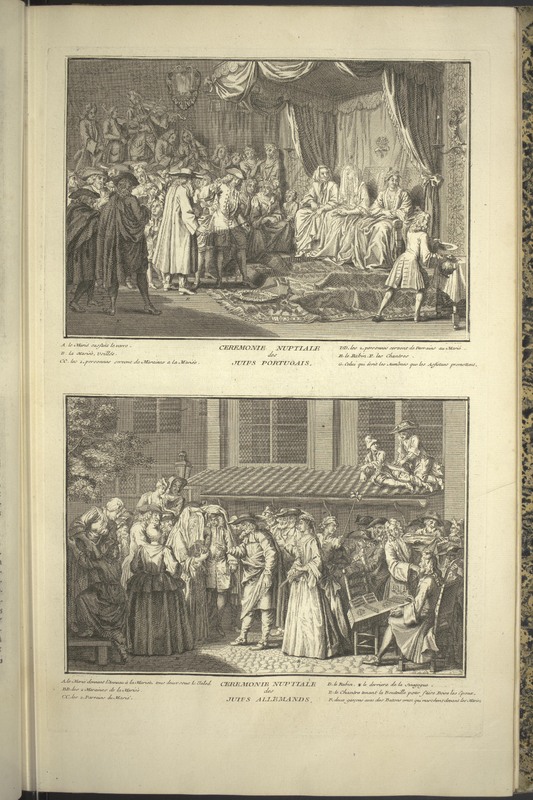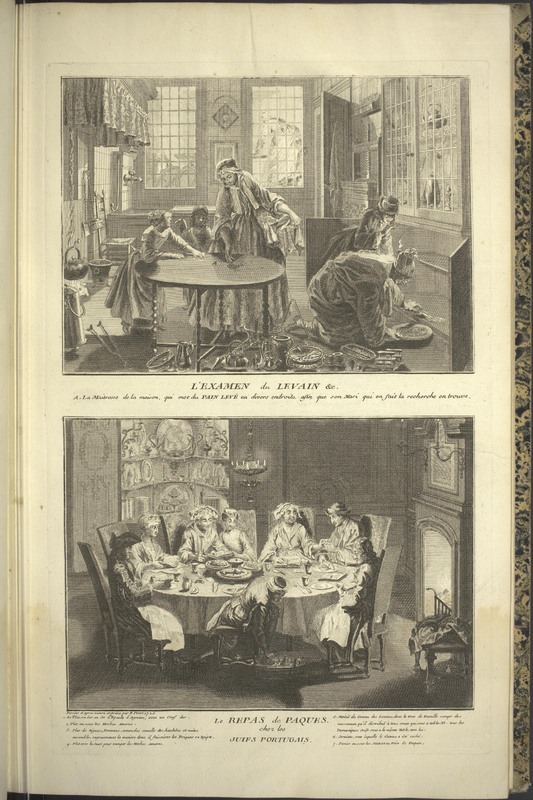Search
-
 Still image
Still imageLes Acafoth ou les sept, tours, autour du Cercueil [et] les Assistans jettent de la terre sur le Corps
Picart, Bernard, 1673-1733A pair of engravings depicting a Jewish funeral (top) and a Jewish burial (bottom). The top engraving shows the hakafoth, a series of seven processions, around the coffin. The bottom engraving shows a group of attendants filling a grave with dirt. -
 Still image
Still imageLa Circoncision des Juifs Portugais [et] le Rachat du Premier Né
Picart, Bernard, 1673-1733A pair of engravings depicting the brit milah (ritual circumcision) (top) and the pidyon haben (redemption of the firstborn son) (bottom). The top engraving shows the family of the infant gathered as the rabbi oversees the proceedure. The bottom engraving shows the family of the child gathered around as the father presents the first-born son to the kohen (a priest directly descended from Aaron). -
 Still image
Still imageInstrumens qui servent à la Circoncision
Picart, Bernard, 1673-1733An engraving depicting assorted instruments for the brit milah (Jewish ritual circumcision) (top) and a Torah scroll witht he related trappings, including finials for the ends, a fabric wrap for a closed roll, an ornate cloth mantle to cover the closed scroll, a pointer, and a box holding chits with the names of members of the synagogue to be drawn for aliyot (divided into groups based on status). -
 Still image
Still imageCeremonie Nuptiale des Juifs Portugais [et] Juifs Allemands
Picart, Bernard, 1673-1733A pair of engravings depicting Jewish weddings in Portugal (top) and Germany (bottom). The Portugese wedding shows a gathering indoors, the bride sitting beneath a canopy on a dais as the groom raises a glass to toss it down and break. The German wedding shows a gathering outdoors, the bride and groom trading rings beneath a tallit as the rabbi guides them. -
 Still image
Still imageSimcha Tora ou 'Joye pou la Loy [et] Maniere du condiure les Epoux de la Loy chez eux
Picart, Bernard, 1673-1733A pair of engravings depicting the celebration of Simchat Torah, including the procession of the Torah scrolls around the synagogue, carried by the Chatan Torah. -
 Still image
Still imageProcession des Palmes chez les Juifs Portugais [et] Repas des Juifs pendant la Fête des Tentes
Picart, Bernard, 1673-1733A pair of engravings depicting the daily recitation of the Hoshanot during Sukkot (top) and a Jewish family sharing a meal in their sukkah during the Sukkot festival. The top engraving shows worshippers processing around the synagogue carrying the four Holy Species (palm frond, myrtle, willow branch, and citron) as they recite the Hoshanot. The bottom engraving shows a Jewish family sharing a meal in an elaborately decorated sukkah, with the sukkah of another family in the background. -
 Still image
Still imageLa penitence des Juifs Allemans dans leur Synagogue
Picart, Bernard, 1673-1733An engraving depicting a group of German Jews performing physical penitence within the synagogue, theoretically in observance of Yom Kippur. Two men are shown whipping two other men while a fifth man to the right is removing his coat, presumably to take his turn. Other men are shown around the synagogue reading the Torah while wearing tallitot. -
 Still image
Still imageLe Son du Cor au Premier Jour de L'an [et] le Chipur ou le Jour du Pardon tel qu'il se celebre chez les Juifs Allemands
Picart, Bernard, 1673-1733A pair of engravings depicting the observance of Rosh Hashanah (top) and Yom Kippur (bottom). The top engraving depicts the sounding of the shofar during the celebration of Rosh Hashanah, the beginning of the new year. The bottom engraving depicts a gathering of Jews in reflection on the past year, repenting their sins and asking forgiveness in observance of Yom Kippur. -
 Still image
Still imageL'Examen du Levain &c. [et] le Repas de Paques chez les Juifs Portugais
Picart, Bernard, 1673-1733A pair of engravings depicting a Jewish family preparing for (top) and observing (bottom) Passover. The top engraving shows the family searching for and removing any remaining leaven in the kitchen in preparation for Passover. The bottom engraving shows the family sitting down around a table and participating in a Seder dinner. -
 Still image
Still imageLes Pretres descendans d'Aron donnant la Benediction au Peuple [et] maniere d'Exposer la Loy au Peuple avant que de commancer à la Lire
Picart, Bernard, 1673-1733A pair of engravings depicting a kohen (priest descended directly from Aaron) reciting prayers in the synagogue (top) and a rabbi lifting the Torah scroll for the gathered worshipers to see (bottom). The top engraving shows the kohen on the right with worshipers gathered around wearing tallitot and is labeled as "Synagogue des Juifs Portugais a la Haye" (the Synagogue of the Portuguese Jews in the Hague). The bottom engraving shows a gathering of Jewish worhipers, most wearing tallitot, looking on as a rabbi raises the Torah scroll. -
 Still image
Still imageJewish Liturgical Objects
Picart, Bernard, 1673-1733An engraving depicting liturgical objects associated with Jewish religious practice, including a tallit katan (prayer shawl), tassels, a Sabbath lamp, matsah, the Four Species (a palm frond, brnaches from a myrtle and a willow tree and a citron, waved during the celebration of the harvest festival Sukkot), a shofar (a ram’s horn blown on the holidays of Rosh Hoshanah andYom Kippur), and a mezuzah (a scroll with specific Hebrew verses from the Torah, placed on doorposts of Jewish homes). -
 Still image
Still imageJewish Religious Clothing
Picart, Bernard, 1673-1733An engraving depicting elements of Jewish ritual garments, including a Jewish prayer shawl with tassels (top), phylacteries (small black leather boxes including verses from the Torah), and a Jew wearing both for worship (bottom right). -
 Still image
Still imageDissertation sur le Culte Religieux
Picart, Bernard, 1673-1733A series of four engravings depicting aspects of religious rituals and practices from ancient Mediterranean cultures, including Greek, Roman, and Egyptian. The engraving on the top right depicts a supplicant praying before a temple of Pomona, the Latin and Roman goddess of fruit trees, gardens, and orchards, who is depicted to the supplicant's left. -
 Still image
Still imageIllustrated title page of Histoire générale des cérémonies, moeurs, et coutumes religieuses de tous les peuples du monde
Picart, Bernard, 1673-1733The title page of Histoire générale des cérémonies, moeurs, et coutumes religieuses de tous les peuples du monde, featurnig an engraving depicting, clockwise from the top, Christianity represented by angels surrounding the Bible, bearing the Latin phrase “biblia sacra concilia et traditiones” and a woman holding a communion chalice, Buddhism by two men praying (bottom right), Islam by one man reading the Qu’ran to his suffering companion, and Judaism by a woman reading the Old Testament, as a blindfolded woman with bat wings holds a lantern for her (left). -
 Still image
Still imageWenceslas, Roi de Boheme
Picart, Bernard, 1673-1733An engraving depicting a bust of Wenceslas, King of Germany, surrounded by a sword, manacle, and orbis cruciger with a barred window in the background. -
 Still image
Still imageF. Pogge. Florentin
Picart, Bernard, 1673-1733An engraving depicting a portrait of Poggio Bracciolini hanging in a window above a stack of books on the windowsill with the city of Florence in the distance. -
 Still image
Still imageFrançois Pierre, Cardinal de Foix
Picart, Bernard, 1673-1733An engraving depicting a portrait of Pierre de Foix topped with a galero and surrounded by a cherub holding an olive branch and leaning on a column above a multi-headed dragon that has been decapitated. There is an inscription at the bottom reading, "Il finit le Schisme et donna la paix au Siege de Rome." -
 Still image
Still imageIean Ziska, Duc de Boheme
Picart, Bernard, 1673-1733An engraving depicting a bust of Jan Žižka atop a column featuring a laurel wreath. The figure is wearing armor and a helmet with a partial eyepatch. -
 Still image
Still imageIean Wiclef
Picart, Bernard, 1673-1733An engraving depicting a portrait of John Wycliffe framed in a laurel wreath with a pile of books and papers being burned, representing the declaration by the Council of Constance that his works should be burned. -
 Still image
Still imageIerôme de Prague
Picart, Bernard, 1673-1733An engraving depicting a portrait of Jerome of Prague with a fire built below the portrait, the flames catching along the sides and frame in reference to his execution by burning at the stake. -
 Still image
Still imageJean Gerson
Picart, Bernard, 1673-1733An engraving depicting a portrait of Jean Gerson placed above a pen and ink well, a galero, a dog, a book, and a crest featuring a cherub, stars, and moon.